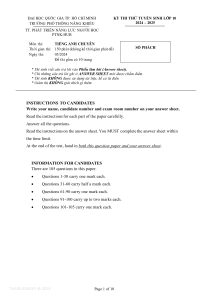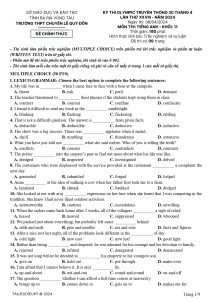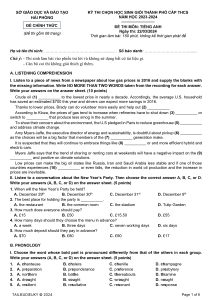Để đạt được thành tích cao trong kỳ thi Chuyên Anh vào lớp 10 THPT, một trong những yếu tố quan trọng là ôn tập và luyện thi bằng tài liệu chính thống và đầy đủ. Và đó chính là lý do Tài liệu diệu kỳ ra đời, với mục tiêu cung cấp những tài liệu học tập và ôn luyện chất lượng cao cho các bạn học sinh. Trong số những tài liệu tuyệt vời này, Đề thi chuyên Anh vào 10 THPT Bến Tre năm học 2022-2023 chính là một trong những lựa chọn tốt nhất để giúp các bạn học sinh chuẩn bị kỹ càng cho kì thi Chuyên Anh năm học 2023-2024.
Tài liệu này cung cấp cho bạn những đề thi chính thức với đáp án, giúp bạn rèn luyện kỹ năng và kiến thức cần thiết để vượt qua kỳ thi. Ngoài ra, trang web Tài liệu diệu kỳ còn cung cấp rất nhiều tài liệu học tập và ôn luyện Tiếng Anh đa dạng và chất lượng cao, giúp bạn có được lộ trình ôn thi vào chuyên Tiếng Anh hiệu quả và đạt được kết quả cao nhất.
Hãy truy cập vào trang web Tài liệu diệu kỳ để tải về Đề thi chuyên Anh vào 10 THPT Bến Tre năm học 2022-2023 và khám phá thêm rất nhiều tài liệu học tập hữu ích khác nhé!
Từ khóa: Đề thi chuyên Anh vào 10 THPT Bến Tre; ôn thi vào chuyên Tiếng Anh; luyện thi Chuyên Anh năm học 2023-2024; Tài liệu diệu kỳ; chuyên Anh Hà Nội.
SỞ GIÁO DỤC VÀ ĐÀO TẠO BEN TRE
ĐỀ CHÍNH THỨC (Đề thi gồm có 08 trang)
ĐỀ THI TUYỂN SINH VÀO LỚP 10 TRUNG HỌC PHỔ
THÔNG CHUYÊN BẾN TRE NĂM HỌC 2022 – 2023
Môn: TIẾNG ANH (Chuyên) Thời gian: 120 phút
(không kể phát đề)
DIEM
BẰNG SỐ
BẰNG CHỮ
HỌ TÊN, CHỮ KÝ GIÁM KHẢO GIÁM KHẢO 1 GIÁM KHẢO
2
SỐ PHÁCH
(Do CTHĐ chấm thi ghi)
Lưu ý : Thí sinh làm bài trực tiếp vào đề thi
và trả lời câu hỏi vào đúng phần qui định.
SECTION I: LISTENING (1.5 points)
HƯỚNG DẪN PHẦN THI NGHE HIỂU
Bài nghe gồm 2 phần, mỗi phần được nghe 2 lần.
Mở đầu và kết thúc phần nghe có tín hiệu nhạc.
Thi sinh đọc kỹ hướng dẫn và câu hỏi trước khi
nghe.
Part 1: You will hear James Hamington talking
about this year summer festival. Listen and choose
the best answer for each of the following
questions. Write your answers at the end of this part.
1. When is this year festival being held?
A. 1-13 January
B. 5-17 January
2. What will the reviewer concentrate on
today? A. theatre
B. dance
3. How many circuses are there in the
festival?
A. one 4. Where does Circus Romano perform?
A. in a theatre
B. two
B. in a tent
C. 25-31 January
C. exhibition
C. several
C. in a stadium
Your answers:
1
2
3
4
Part 2: Listen to a teacher talking about
invigilating exams and complete the sentences.
The interviewer asks the teacher what he does
while he is supervising students taking an exam in
Invigilators and candidates must remember to
5
6
Page 1 of 8
Invigilators should walk up and down between
the desks roughly every
which should be enough to make sure that there
is no foul play without interfering with candidates'
8
People-oriented invigilators may try to
predict the candidates'
The invigilators can imagine talking to a(n)
7
9
10 about one of
these candidates in the future.
The words-oriented invigilators might make. up
a(n)
being in the exam room.
David suggests the words-oriented invigilators
might make up a(n)
The numbers-oriented invigilator could
calculate the numbers of days till the invigilator
The invigilator could also calculate how much
money the invigilator will make during the
14
11
about
12 story.
13
The invigilator must be on the lookout for
SECTION II: PHONETICS (0.5 point)
15 behavior.
Part 1: Choose the letter A, B, C or D to
indicate the word whose underlined part is pronounced differently from the
other three in each of the following questions. Write your answers at the end
of this section. (0.2 point)
Question 1: A. periscope
Question 2: A. imagined
B. catastrophe B. rained
C. telescope C. followed
D. microscope D. learned
Part 2: Choose the letter A, B, C or D to
indicate the word that differs from the other three in the position of the
primary stress in each of the following questions. Write your answers at the
end of this
section. (0.3 point)
Question 3: A. sewage
Question 4: A. unselfish
Question 5: A. misbehavior
B. simple B. counterpart B. generational
C. hobby C. dinosaur C. appreciative
D. describe
D. interval D. education
Your answers:
1
2
3
4
5
SECTION III: LEXICO AND GRAMMAR (3.0 points)
Part 1: Choose the word or phrase that best
completes each sentence below. Write your answers at the end of this section.
(1.0 point)
Question 1: Arian did not drown as they
A. have expected
B. expected Question 2: The escaped prisoner
is still
A. in
B. at Question 3: One of the boys took the
cattle and buffaloes out to graze in the early morning,
A. didn't he
B. didn't they
because he was saved by a dolphin.
C. had expected D. were expected large and the
public are advised not to approach him.
C. of
D. on
C. weren't they
D. wasn't he
Page 2 of 8
uestion 4: She
you last week, for she was not there.
A. must not have seen
C. could not have seen
Question 5: The party was awful. Jane wishes
she
A. did not go
C. has not gone
B. had not gone
B. should not have seen D. hadn't seen
D. would not have gone
Question 6: It's very important that we
condition.
A. are notified
Question 7: Such
A. attraction is it
to it.
as soon as there's any change in the patient's
B. being notified C. were notified
of the festival that every tourist takes a
chance to enjoy it.
B. is the attraction
D. be notified
C. is it the attraction
Question 8:
D. attraction is it he tried to fix the
machine.
A. Not being a computer expert notwithstanding
C. Though no computer expert
B. Despite of not being a computer expert D.
In spite of being no computer expert
Question 9: - Cathy: Eddie, I've never heard
you sing before. You're a really great singer.
- Eddie:
A. That sounds silly.
C. Yes, that's right.
B. I used to sing when I was younger. D.
Thanks. It's nice of you to say so.
Question 10: - Zach: "Mr. Louis, we do
appreciate your taking the time to help us."
-
Kurk: "
A. Allow me to offer my congratulations.
B. I'm glad to be of some service.
C. Thank you. I'm sure I don't deserve it.
D. Why don't you buy me something as a reward?
Your answers:
1
2
3
4
10
5
6 7
00
8
9 10
Part 2 (0.5 point):
Choose the word or phrase that is CLOSEST in
meaning to the underlined in each of the sentences. Write your answers at the
end of this part.
Question 11: The Little Foxes, a drama by
Lillian Hellman, was first introduced in New York in 1939.
B. novel
A. play
Question 12: The police are looking into the
murder.
B. investigating
C. music
C. doing
D. dance
D. ignoring
A. redoing Question 13: Mrs. Helen is always
complaining that her teenage son is very lazy, but he won't change as long as
she's willing to fetch and carry for him.
A. indulge
B. bring up
C. educate
D. ignore
Choose the word or phrase that is OPPOSITE in
meaning to the underlined in each of the sentences. Write your answers at the
end of this part.
Question 14: If we had taken his sage advice,
we wouldn't be in so much trouble now.
B. clever
C. unwise
Question 15: I want you to carry on with the
project while I am out of town.
A. unwilling
A. bring
Your answers:
B. end
C. abandon
D. eager
D. stop
11
12
13
14
15
Page 3 of 8
art 3: Use the correct form of the words given
to complete each of the sentences below. Write your answers at the end of this
part. (1.0 point)
Question 16. The journalist refused to reveal
the identity of his
Question 17. They all cheered
as their team came out.
men by six to one.
Question 18. In my factory, women tend to
Question 19. Small children are very
copy what they see.
Question 20. How can you explain the
There's not a grain of truth in any of them.
INFORM
ENTHUSIASM
NUMBER
in their behavior. They just IMITATE
of your statements?
VALID
Your answers:
16
17
18
19
20
Part 4: Choose the underlined part that needs
correction in each of the following questions. Write your answers at the end of
this part. (0.5 point)
Question 21. The first American to be worth
the equivalent of one million dollars was probably
A
B
plantation owner Robert King Carter, whom
father arrived in Virginia in 1635 and began buying land.
C
D
Question 22. The more hardly he tried, the
worse he danced before the large audience.
A
B
C
D
Question 23. John Dewy thought that children
will learn better through participating in
A
experiences rather than through listening to
lectures.
C
D
B
Question 24. Before creating the telegraph,
Samuel Morse did his living as a painter.
A
B
C
D
Question 25. Theoretical biologist Aristid
Lindenmayer is known for him description of the
A
C
developmental processes in multicellular
structures.
B
Your answers:
D
21 22 23
24
25
SECTION IV: READING (2.5 points)
Part 1: Read the text below and think of the
only ONE word which best fits each gap. Write your answers at the end of this
part. (1.0 point)
Water: are you drinking enough?
Practically the only time I drink water is
(1). I'm working out at the gym and can feel my body. crying out for it. Like
millions of people, the rest of the time I prefer (2)
flavour
to
my
Page 4 of 8
everage. Insufficient consumption of water is
a serious problem, according to scientists, who claim that anyone drinking less
than eight glasses of pure water per day is at risk of dehydration. The
consequences, they say, include poor performances (3).
work, depression, allergies and even
some cancers. Adding to the problem of getting
this message across to the public is the fact (4). recent studies show drinking
too much water can also jeopardize your health, causing acute water
intoxication'. Salt in the blood is diluted, depriving the brain, heart and
muscles of the amounts they need to function properly. But, according to Dr
Wendy Doyle of the British Dietetic Association, 'It's very (5)
to happen except in the most extreme
circumstances.'
Your answers:
1
2
3
4
5
Part 2. Read the following passage and choose
the most suitable word for each of the blanks. (1.0 point) It may seem unlikely
that monkeys or cats would be able to hear the subtleties in human speech.
After all, creatures other than humans neither speak human languages nor
comprehend most of them. (6)
scientists who study hearing have found that
the auditory system of animals and humans respond to speech sounds in
remarkably (7).
ways.
Scientists see hearing in humans and higher
animals (8).
(9)
an act of computer-like processing
they are put back together and
which a sound enters the ear and is broken
down into components. These are transported in some coded form through the
nervous system to the brain, (10). interpreted.
Scientists believe that, in large part, how
speech is processed is (11).
on its acoustical properties. Research with
(12).
shows that they can discriminate among subtle
nuances in speech. For example, our ears readily distinguish two similar speech
sounds, "ba" and "da" on the (13)
of differing pitch changes that occur in the
first one-twentieth of a second of sound. During the 1970s, William Stebbins
conducted (14).
using monkeys at the University of Michigan
Hearing Research Institute which showed that monkeys possess a similar (15).
similar sounds into distinct categories.
to put
Question 6. A. Thus
Question 7.
A. same
B. However B. similar
C. Most
C. variety
D. Otherwise
D. all
Question 8.
Question 9.
A. from
A. have
B. by B. data
C. as
D. are
C. system
D. in
Question 10. A. which
B. where
C. why
D. when
Question 11. A. based Question 12. A. animals
Question 13. A. tone Question 14. A. survey Question 15. A. ability Your
answers:
B. depend
C. relied
D. relying
B. experiments
C. evidence
B. speech
C. basis
B. methods
C. by
B. property
C. language
D. sound
D. scale
D. experiments D. hearing
6
7
8
9
10
11
12 13
14
15
Page 5 of 8
Part 3: Read the following passage and choose
the letter A, B, C, or D to indicate the correct answer to each of the
following question. Write your answers at the end of this part. (1.0 point)
Sleep is a natural process, and although a lot
have been written about the subject, it is still surrounded by mystery. It is
used by some as an escape from the world, and regarded by others as an
irritating waste of time: some people get by on very little, others claim they
can not exist without at least ten hours, but nobody can do without sleep
completely.
Our night's sleep does not just consist of a
steady phrase of gradually deepening sleep. It alternates between two stages:
Non-dreaming or ordinary sleep, and REM (rapid eye movement) or dreaming sleep.
As soon as we fall asleep, we go straight into non-dreaming sleep for an hour
or so, then into REM sleep for about 15 minutes, then back into non-dreaming
sleep. It alternates in this way for the rest of the night, with non-dreaming
sleep tending to last longer at the beginning of the night. Non-dreaming sleep
occupies. three quarters of our night's sleep, about a quarter of it deep and
the rest fairly light.
It is widely believed that sleep repairs the
body and makes good the damage caused by being awake. However, its main
function is to refresh the brain. Experts believe that probably only about
two-thirds of our sleep is necessary for repairing and refreshing the brain,
with the most valuable sleep coming in the first few hours of the non-dreaming
period, the last few hours of sleep are not so essential. The brain can manage
quite well with reduced sleep as long as it is uninterrupted sleep.
The quality of sleep is important. A study conducted in the USA looked at short sleepers, who slept for 5.5 hours on average, and long sleepers, who had 8.5 hours or more. It is discovered after a variety of tests that the long sleepers were poor sleepers, had twice as much REM sleep as the short sleepers, appeared to sleep longer to make up for the poor sleep, and did not wake up in the morning refreshed. Similarly, people who sleep deeply are not necessarily getting a better quality of sleep than shallow sleepers. Deep sleepers can feel tired the following day, so six hours of good sleep is worth more than eight hours of troubled sleep.
Question 16. It can be concluded from the
first passage that
A. people need equal time of sleep
B. sleep is among the processes of the nature
C. sleep remains a puzzle
D. everything about sleep has been brought to
light
Question 17. All the following are true,
EXCEPT for
A. we spend only 25 percents of our night's
sleeping time to dream
B. our night's sleep occurs in a straight line
of only two phases
C. all sleeps are similar in the alternatives
of the two stages during the night
D. we often have no dreams after we fall
asleep
Question 18. Unlike the common belief, sleep
helps
A. not to be awake
C. our brain to rest and recover
Question 19. It can be inferred from the
experts' ideas that
A. Nearly 70% of our sleep is invaluable
B. REM makes good our brain
C. Dream enables our body to refresh
B. us to repair our body
D. us to fix the damage happening by day
D. if we can sleep uninterruptedly, it is not
necessary to sleep the whole night
Question 20. The study in the USA suggested
that
A. the fewer hours we sleep, the more we dream
B. the type of sleep is more important than
its length
C. Deep sleep means better sleep
D. Six hours of sleep is better than eight
hours.
Page 6 of 8
21. Which of the following is NOT discussed in
the passage?
A. The problem with sleepless people
C. The role of the sleep
B. The circle of sleep
D. Types of sleep
Question 22. The word "occupies" in
paragraph 2 could be best replaced by
A. accounts for
B. takes care of
C. works out
Question 23. The word "irritating"
in paragraph 1 most likely means
B. annoying
A. comforting Question 24. The word
"it" in paragraph 2 refers to B. our night's sleep
A. the REM Question 25. This passage is most
likely taken from
A. a health magazine C. a fashion magazine
D. goes up
C. calming
D. soothing
C. the ordinary sleep
D. the night
B. a doctor's description
D. an advertisement
Your answers:
16 17
18
19 20
21
22 23 24 25
SECTION V: WRITING (2.5 points)
Part 1: Finish each of the following sentences
in such a way that it is as similar as possible in meaning to the sentence
printed before it. Do not change the word given. (1.0 point)
Question 1. "Keep off the grass",
the sign says. MUSTN'T
You
Question 2. David impressed his new boss by
settling down to work. GOOD
David
Question 3. The builders installed a wind
turbine on Mr. Sean's roof. HAS
Mr. Sean
Question 4. I wasn't planning to read the
whole newspaper. INTENTION
→ I had
Question 5. The young girl stopped working
though the salary was very high. GAVE
→ No matter how
Part 2: It is not necessary to travel to other
places to learn the culture of other people. We can learn just as much from
books, films and the Internet. To what extent do you agree or disagree?
Write a well-organized essay of about 150-180
words to give your reasons for your answer and include any relevant examples
from your own knowledge or experience. (1.5 points)
Your writing:
Page 7 of 8



